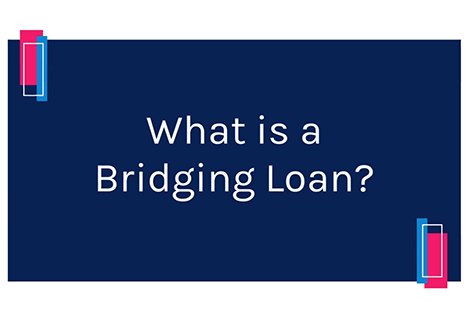What is a bridging loan?
A bridging loan is a short-term borrowing solution that is secured against a property. They can be used if you need to fund plans quickly but don’t have the money readily available.
In other words, these loans help to ‘bridge the gap’ until you have sorted out a longer-term financial solution.
The speed and flexibility of these loans makes them a popular borrowing option, with many people using them for a range of purposes.
One example is you may have found a perfect property to buy, but your current house hasn’t sold yet, so you do not have the funds ready to complete the transaction. In this case, you could take out a bridging loan to fund the purchase. Once the sale of your house goes through, you can use the money to repay your loan.
Our dedicated team will always try to find you a product that will allow you to achieve your goals.

Is a bridging loan right for me?
Deciding if the loan is right for you depends on what you need the funding for and how quickly you will be able to repay it.
If you’re in need of fast, short-term finance to fund a particular purpose and you have a clear repayment strategy in place, then it may be a good solution for you.
Interest rates are usually higher on these products compared to longer-term options, so it's a good idea to think about it carefully before you proceed.

What can I use a bridging loan for?
One of the most common uses of these loans is property and auction purchases. But, there are many other uses of these short-term loans including:
- Secure a property quickly
- To break a chain (chain break bridging)
- Refurbishment (light and heavy)
- Purchasing uninhabitable properties
- Where a short lease can’t be funded in a normal way
- Capital raising
- Development funding
- Land purchase pre planning
- Gifted transactions
- To cover cash flow needs
- Conversions and title splits
- Site acquisition
- Planning applications
Our team of experts are available to talk through your options whenever you wish. Simply call or use the online form above to start the process and let us take the work off your hands.
Get Started
Call us for FREE or enquire using the form below.
Don't forget – making an enquiry will not affect your credit rating in any way!

How much can you borrow with a bridging loan?
Loan sizes may vary between lenders, as they may have different criteria. It will also depend on your exit plan (i.e. how you intend to repay the loan) and other personal circumstances.
The size of the loan may be small or large, it depends on the reason you are borrowing. For instance, if it is a property purchase you may need a much greater loan size than if you are just funding some refurbishments.

How do bridging loans work?
Similar to secured loans, bridging loans use a property you own as security. Either you can use a residential or commercial property to secure the loan or even land. This means if you default on your loan, your property could be repossessed.
With bridging loans, there are two different types you can get, which will affect your repayment schedule.
An open bridging loan is a type that does not have a set repayment date, although most lenders would like it to be repaid sooner rather than later. So, this may be ideal if you’re unsure of exactly when you will get your longer-term finance. For example, if you’re waiting for your house to sell.
Whereas, a closed bridging loan does have a set repayment date. Therefore, if you get this option, you will need to repay the loan by the date you agreed with your lender.
Lenders will always want to know how you plan to repay the loan (your exit plan), and they will want to see proof of this. For this reason, you must have some sort of plan ready.
Regardless of the type of loan you need, our advisors are ready to help you. We always aim to find you a product that will allow you to fulfil your goals.

Types of bridging loans
There are different types of bridging finance that are available. These are regulated and non-regulated loans.
- Regulated bridging loans are secured on a property you are living in or intend to live in.
- Non-regulated bridging loans are useful for corporate entities or properties you are NOT going to live in.
As a specialist bridging loan broker, we have access to both regulated and non-regulated loans. We will do our very best to try and find you a suitable loan as fast as possible.
Regulation under the FCA aims to provide consumers with protection including being covered by the Financial Services Compensation Scheme (FSCS), which helps to protect you against bad advice and mis-selling, among other things.
Find out more about these different types in our blog regulated vs unregulated bridging loans.

Advantages and disadvantages of bridging loans
Before you apply, it is important that you consider whether it is the right finance option for your plans. So, it is worth thinking about the benefits and drawbacks. These are:
Advantages:
Fast funds – Compared to other types of loans, bridging finance can be a lot quicker. So, if you have plans that need funding fast, this could be really useful to you. If you want to find out how to speed up the process, read our guide to fast bridging loans.
Large loan sizes – As a property has been used as security, lenders are often more relaxed about giving larger loan sizes to borrowers.
Range of choices – They can be quite flexible and offer a great amount of choice, as they have a variety of interest rates and repayment terms available. Also, a selection of different property types can be used to secure the loan too.
Disadvantages:
Higher interest rates – The interest rates for short-term finance are usually higher than longer-term solutions. Therefore, you may be charged a higher interest rate with this finance option.
Your home could be repossessed – Similar to other types of secured finance, your property is at risk of repossession if you fail to make your repayments.

How do I make an enquiry?
Making an enquiry to our experts is easy. You can speak with an advisor on the phone by calling us (all calls are free). Alternatively, you can fill in our online form above or email the team and we’ll call you.






